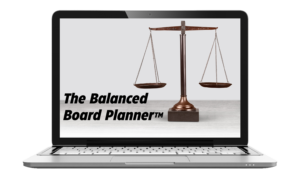You may have a wonderful board of directors – nice people who are friendly, show up to meetings, get along with each other, and respect the CEO. These are all good things. However, do you have people with the right knowledge, skills, and abilities to lead your organization to success? Do you even know what those competencies should be?
Many organizations just leave the makeup of their board to chance or they accept anyone who is willing to serve in a director role. I realize that it is hard for some organizations to find people who are willing to give of their time to serve, especially if it is without pay, in a very responsible role.
What is the alternative?
The alternative is to take a proactive approach to looking at the needs of the organization, and creating a list of ideal skills, knowledge, and abilities that should be represented on your board. Your board could accomplish this activity by completing the following steps:
- Assess the needs of your organization. Review the mission, vision, and value statements of the organization along with the key priorities for the next three to five years.
- Taking into consideration the needs of the organization, create a list of the ideal competencies that you feel should be represented on the board. Some common competencies include: strategic thinking ability, knowledge of board governance, knowledge of or experience in auditing or accounting, and senior management experience. There are many potential competencies and these will vary depending upon the needs of your organization.
- Assess the current board members. After you have developed the list of competencies, have each board member perform a self-assessment stating which competencies they possess.
- Create a plan to fill the gaps. Will every competency be represented on your board? Maybe not. Does this mean that you should have some board members leave the board so you can get others that have these competencies? Not necessarily. There is no need to kick members off your board. What this exercise does is it shows you what you should be looking for in future board members and also gives you the opportunity to create educational opportunities for current board members to develop the skills and knowledge that might be lacking on your board.
Just like employers should always be on the lookout for good potential employees, the board should be doing a regular assessment of their needs and actively searching out people who might fulfill those needs.


